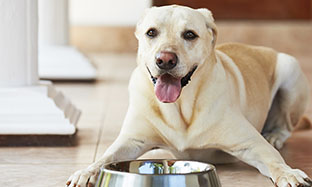.jpg)
How food requirement changes with age in dogs?
The link between diet and health is paramount, not just for humans but also for our beloved canine companions. Just like us, dogs have evolving nutritional requirements that change with age, activity level, health status, and more. Understanding these shifts is crucial in providing optimal care and ensuring their long-term health and well-being. Let us understand the dog food by age, catering to their specific life stages.
Nutritional Requirements for Puppies
Did you know, we humans take 18 years to reach adulthood, whilst our four-legged buddies do so in a mere 24 months? For this reason, during the puppy life stage, nutrition plays a key role in helping rapid growth and development. Puppies require a diet rich in protein, calories, and minerals to meet their energetic demands and support healthy growth over a short period of time. Specifically formulated puppy food by age is essential during this phase, as it provides the necessary nutrients in appropriate ratios to promote bone and muscle growth while ensuring proper immune function. Puppy food by age, also plays close attention to the delicate digestive system at this stage of life, ensuring the food is highly digestible and easy on the gut.
In medium, large & giant dog breeds, the growth phase can be divided into 2: i) The first is rapid (up to 6 to 7 months of age), ii) while the second marking the end of the growth phase is slow (between 6 to 18 months of age). The second phase is akin to adolescence, where young dogs have less intense nutritional requirements. High protein requirement needs to be coupled with comparatively lower energy requirements to avoid a predisposition to excess weight gain and to joint conditions. Failure to provide adequate nutrition during this critical growth stage can lead to stunted development, skeletal challenges, and potential health issues down the road.
Nutritional Requirements for Dogs
As dogs transition into adulthood, their dietary needs may shift depending on factors such as activity level and reproductive status. Adult dogs require a high in animal protein, low in carbohydrates diet that provides sufficient energy to support their daily activities without the excess calories that could lead to obesity. Furthermore, high quality animal protein also helps with maintaining muscle mass, better digestion, urinary health, skin & coat support, etc.
It is essential to select a pet food specifically formulated for adult dogs, avoiding products labelled for puppies or all life stages, which may contain higher fat and mineral content. Proper nutrition during adulthood is crucial in maintaining a healthy weight, supporting muscle function, and preventing lifestyle diseases like obesity, diabetes, etc..
Food for Elderly Dogs
In the senior life stage, dogs may experience age-related health issues that warrant dietary adjustments. Food for elderly dogs enriched with joint-supporting ingredients like glucosamine and fatty acids can promote mobility and manage conditions like arthritis.
Moreover, senior dogs may have decreased calorie needs due to reduced activity levels, making it important to choose a diet containing high quality animal protein that maintains muscle mass while low in carbohydrates to prevent excess weight gain. Dietary modifications tailored to address specific health concerns, such as kidney or heart disease, can also play a crucial role in managing these conditions and enhancing quality of life.
Special Considerations: Pregnancy, Spaying, and Neutering
Pregnancy introduces unique nutritional demands, requiring a diet rich in high-quality protein and essential nutrients to support the health of both the mother and her developing puppies. Similarly, lactating dogs require increased calorie intake to meet the demands of nursing.
Spaying and neutering procedures offers a plethora of health benefits. However, it decreases a dog's metabolism whilst increasing appetite, thus necessitating adjustments in their diet to prevent weight gain and maintain optimal health. Specialized pet foods designed for spayed or neutered pets with emphasis on high quality animal proteins, low in carbohydrates and presence of dietary fibres that help satiety, can help manage these changes and support long-term well-being.
Virbac's Veterinary HPM Range: Meeting Diverse Needs
Nutritional balance is at the core of Virbac's Veterinary HPM range, ensuring dogs receive the right combination of nutrients for a feeling of fullness, sustained energy throughout the day, appetite control, and effective weight management, particularly in adults. Formulations tailored for different life stages cater to the distinct needs of puppies, young dogs (juniors) and adult dogs' bodies, prioritizing high-quality animal protein to support appetite regulation, a healthy metabolism, and optimal growth in juniors, while ensuring adults maintain an ideal weight.
Clear labels and feeding guidelines of the Virbac's Veterinary HPM Range simplify the process of deciphering your dog food by age, ensuring they receive precise, easy-to-understand information. Both junior and adult diets emphasize high quality animal protein as the primary calorie source, with moderate fat and minimal carbohydrates, delivering comprehensive, balanced nutrition tailored to meet the specific needs of altered pets.
Understanding dog food by age is essential for promoting optimal health and longevity. By providing tailored nutrition that addresses the unique needs of puppies, adults, and seniors, pet owners can ensure their canine companions thrive at every stage of life. Remember, consult with your veterinarian to determine the best dog food by age based on their individual needs and health status.
- What is an adapted diet for puppies?
- What nutritional needs for my adult dog ?
- What nutritional needs for my senior dog ?
- Worms in Dogs: Diagnosis, Prevention, and Treatments
- General care for dogs
- What nutritional needs for my senior dog ?
- What nutritional needs for my adult dog ?
- Worms in Dogs: Diagnosis, Prevention, and Treatmentss
- General care for dogs


